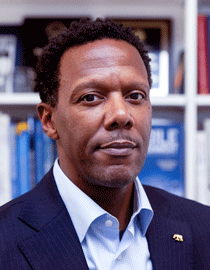Loss, fear and rage: Are white men rebelling against democracy?
After decades of economic, political and cultural change, many white men feel left-behind, Berkeley scholars say. Some of these men are taking justice into their own hands.
November 14, 2022

During the midterm election campaign, U.S. Senate candidate Blake Masters of Arizona embodied a modern political archetype: A white man with deep grievances and a belief in racist conspiracy theories — and weapons as a thinly veiled threat against democracy. (Photo from Masters for Senate campaign video)
In the aftermath of David DePape’s attempt to kidnap U.S. House Speaker Nancy Pelosi and his hammer assault on her husband, Paul, analysts pored over the suspect’s online postings, looking for motivation among a toxic stew of grievance. Some connected him to the spirit of the January 6 right-wing mob that attacked the U.S. Capitol. Many seemed to see him as just another inexplicable flashpoint in the explosive politics of our time.

Berkeley News is examining threats to American democracy in a new series drawing on the expertise of UC Berkeley scholars.
The attack arguably fits a broader pattern, though, one that extends from Donald Trump’s use of the “birther” conspiracy to delegitimize Barack Obama, the nation’s first Black president, to the torchlight parade of young neo-Nazis in Charlottesville, Va., and from the Supreme Court decisions this year that expanded gun rights and rescinded abortion rights to the venomous narratives spun by some hard-right candidates in this fall’s election campaigns.
Each of these chapters feels like a violation of democratic processes and the democratic spirit, often rising from some compound of racism, sexism, homophobia and antisemitism. But in a series of interviews, Berkeley scholars traced a thread that seems to weave among our conflicts:

Raka Ray (UC Berkeley photo)
After decades of economic, political and cultural change, a makeshift force of white men is rebelling against democracy.
“The way certain developments in the economy, in politics and in the social world have gone in the last 40 years has led to working-class white men … feeling like their authority has been undermined,” said sociologist Raka Ray, dean of social sciences at UC Berkeley. “When you get strong feelings of anger and despair in a group or a population, that can turn very quickly into giving encouragement to the politics of resentment or the politics of revenge.”
To be sure, the anti-democratic movement features some prominent women. Millions of American men, meanwhile, have adapted to the transformational changes and often embraced them, and now oppose today’s threats against democracy.
But the Berkeley scholars, across a range of disciplines, suggest that for millions of men — most of them white, many of them working-class — these decades have seemed like a time of unravelling. Industries are dying, and their wages are stagnant. Their political power and cultural status are diminished. Our core ideas about manhood and masculinity are in flux.

David C. Wilson (Photo by Brittany Hosea-Small)
Though white men as a whole remain dominant across society, the scholars said their widespread feelings of loss and insecurity are linked to deep psychological reactions — a sort of bitter nostalgia, a sense they are being cheated and left behind, a growing conviction that they must take justice into their own hands.
Political scientist David C. Wilson, dean of the Goldman School of Public Policy at Berkeley, said this deep-seated resentment has been activated by fears that the merit system in America is being overturned, and that the dominant system of privilege will be replaced by undeserving minority voices seeking special considerations based purely on race. Such fears are amplified by the appeals of public figures who are anti-change and supported by dark-money donors and right-wing media — with powerful effect.
“There’s not just one thing — it’s a host of things that signal to these men that change is coming,” Wilson said. “And people are concerned about it to the point that they’re willing to give up some of the longstanding principles and practices of democracy.”
Structural change poses an unprecedented threat to men’s power and identity
In the memory of many men over 40 years old, there is a time not long past when it was possible to have a solid job in manufacturing or mining — a good job with union pay and benefits, enough to take care of a family.

For many men over 50 years old, memories remain vivid of a time a few decades ago when jobs in mining and industry were relatively plentiful and well-paid. But those industries began to contract in the mid-20th century. (Wikimedia Commons photo by Jack Corn)
“There’s a long period — the period from the end of World War II up until 1973 — where you see white men earning breadwinner wages, rising wages,” said sociologist Leslie Salzinger, chair of Gender and Women’s Studies at Berkeley. “There was a higher share of profits going to labor as opposed to capital. There were more workers in unions.

Leslie Salzinger (UC Berkeley photo)
“But…you just see all of that falling off over time.”
In his new book “Slouching Toward Utopia,” Berkeley economist J. Bradford DeLong argues that the cycle of change and rebirth has played out continually in the American economy for some 150 years. Starting in 1870, he writes, the pace of technological change quadrupled, followed by accelerating social change.
“In every generation, entire occupations, industries, livelihoods and communities are simply swept away,” DeLong said in an interview. “The market judges that they’re no longer profitable, and we need to shut them down. So there are enormous stresses on the society, in every single generation.”

J. Bradford DeLong (UC Berkeley photo)
Since the middle of the 20th century, that stress has fallen most heavily on working-class men in the old industrial and mining regions of the country — the steel and auto plants of today’s Rust Belt, the mining regions of Appalachia, the timber economy of the Pacific Northwest.
In 1950, DeLong said, 30% of U.S. workers were in manufacturing jobs, but they account for just 9% today. In 1970, 25.5 million workers were in manufacturing, compared to 8.4 million today. Jobs in mining and farming also have registered steep declines.
No surprise, then, that the wealth of white working-class men and families has fallen, too.
In 1970, median income for white men was vastly higher than for any other group. Since then, however, their income has been roughly flat, while income for women and workers of color have slowly but steadily increased. In 1980, white working-class families earned 45% of total U.S. income, but by 2019 that fell to 27%, with a similar plunge in their share of total U.S. wealth.
Men’s struggles can be measured in a number of other metrics. Women now outnumber men enrolled in U.S. colleges and universities, and among degree-holders in the workforce. That means many men have diminished career and income prospects, which makes them less attractive as marriage partners. They’re less sexually active. Their suicide rates are spiking.
Over the past 150 years, rapid, transformative change has produced repeated traumatic shocks, and the stresses predictably lead to “a severe rebellion, a severe political movement,” DeLong said.
“People say, ‘The system really is not working for us. We need to overthrow the system and replace it with something else,’” he explained. “And so whatever system was put in place a generation ago, whatever lines were drawn in political economy, whatever income distribution … you’re going to face a strong revolt against it in this generation.”
Five psychological forces driving the white male rebellion
What leads some men to viciously demonize a prominent woman politician like Hillary Rodham Clinton? What leads people to believe the conspiracy theory that Barack Obama is a Muslim, born in Kenya and therefore not a legitimate president?
Berkeley scholars say today’s anti-democratic impulse is profoundly complex. Economic dislocation is one driver. Racism, sexism and homophobia are a deeply rooted cultural legacy, and for centuries white men have used political force and actual violence to deny power to people of color, women and LGBTQIA+ communities.
And yet other deep forces are at work. In interviews, the scholars described five social and psychological dynamics that are driving some white men to revolt against democracy:
1. Organizing against perceived threats

Timothy R. Tangherlini (UC Berkeley photo)
Timothy Tangherlini is a folklorist in the Department of Scandinavian Studies at Berkeley, and his work has explored how “cultural ideology” is transmitted. One of the primal forces that hold communities together, Tangherlini said, is a process of defining enemies and organizing against threats.
“People are creatures of habit, so we like things to be the way they have been in the past,” he explained. “Then someone comes along and says, ‘Not only are things not going to be the way they were in the past, but the things that you value highly are not going to be valued highly anymore,’ or ‘You’re doing something that should not be valued highly.’
“People do not take well to that type of direct challenge to their norms, their beliefs, their values.”
2. Masculinity and self-worth in the “domain of loss”
Working-class men have had little power to protect themselves and their families from the changes of the past half-century, or from the Great Recession or the COVID-19 pandemic. That, Ray said, has left many questioning their own worth.
“Within a capitalist system, men were given the job of being breadwinners,” she explained. “So, when a man’s job is lost or income is lost, men feel diminished not just as workers, but as men, because they have failed to be providers. If we only think of lost income, we fail to correctly understand the source of their pain.”

Cecilia Hyunjung Mo (Photo by Brittany Hosea-Small)
In Western history, it’s not the lowest class that usually rebels — it’s the dominant class that loses power, said Berkeley political scientist Cecilia Hyunjung Mo.
As the authority of white men has declined, they understandably “start feeling discontent,” Mo explained. “They feel that they are in the domain of losses rather than the domain of gains, and generally, people are more emotionally affected by losses than by gains.”
Actual and perceived losses are particularly intolerable for men. “Think of how boys and men have been socialized,” she said. “You learn, as a man, that you’re supposed to be dominant, aggressive. You’re supposed to be competitive. You’re supposed to win.”

Ulrike Malmendier (Haas School of Business photo)
The discontent is even more pronounced when economic disruption harms some and favors others, said Ulrike Malmendier, co-director of Berkeley’s Initiative for Behavioral Economics & Finance.
“You almost feel singled out,” Malmendier said. “You feel that disaster was specifically designed for you. Maybe it will generate an us-versus-them feeling — in behavioral economics, we have a lot of evidence on that. That could exacerbate depression and polarization.”
3. Blaming those who break the “rules”
People in communities suffering such loss of status struggle to see themselves as primarily responsible — and resentment motivates unbreakable chains of blame, denial and avoidance, said Wilson, the Goldman School dean. “If you ask most people in this state of loss, ‘Is this your fault?’, they tend to say, ‘Hell no, it’s not my fault!’ They are motivated to attribute gains to themselves, but losses to others.”
For example, technological and economic change may explain the decline of Rust Belt towns or old farming communities. But Wilson, co-author of “Racial Resentment in the Political Mind,” said, residents there may be inclined to turn their ire on people of color or immigrants, or on “elites” perceived to promote and benefit from the political and policy change.
Some white people get upset when employment or school enrollment programs help improve the economic and social conditions of Black or Latinx people, even though those groups have suffered generations of discrimination and even when they work hard for what they achieve. They’re angry that undocumented immigrants get jobs, even when the jobs are difficult and low-paid. They’re outraged when a trans woman seeks to compete on a woman’s swim team, even when such examples are vanishingly rare.
When a dominant group begins to lose its privileges, some members perceive that the advancing groups are “cutting the line,” Wilson said. “They’re seen as breaking the rules” — not legal rules, but cultural rules, moral rules.
“And when they feel like the rules that they have come to master no longer matter … they feel there’s an injustice. That injustice has to be repaired.”
4. Nostalgia and the appeal of authoritarianism
In such a psychological climate, Wilson said, displaced white men may be more inclined to look “for a champion of their perspective to make them feel secure again.”

The slogan “Make America Great Again” was a classic play to white racial resentment, says Berkeley scholar David C. Wilson. It conveys a powerful appeal to white anxiety over shifting demographics without ever referring overtly to race. (Flickr photo by James McNellis)
That’s the organic genius of Donald Trump: He knows how to connect with the wounded white spirit, the scholars said.
“Make America Great Again — not just great, but great again,” Wilson said. “That word is powerful. ‘Let’s get these things back to the way they should be. There’s gonna be so much winning. We’re gonna be on top again.
“‘And anybody causing trouble, we’re going to pop them on the head.’”
The message — that promise — has helped to radicalize working-class white men and others who long for the security and dominant status they enjoyed in times past, scarcely acknowledging that the game then was, by law and culture, rigged in their favor.
“When you are in the domain of loss,” Mo said, “you’re more risk-tolerant…. So you have a sort of perfect storm: People are angry about what they have lost, which results in them being more willing to take risks and more susceptible to listen to rhetoric that makes them feel justified for feeling upset.
“That can lead to a lot of bad outcomes — for example, you might be more inclined to join an insurgency.”
5. Propaganda, resentment and rage
Thirty years ago, the top 1% of American earners held a quarter of U.S. wealth. But even after the Great Recession and the COVID pandemic, their wealth has grown by trillions of dollars, and today they hold almost a third of the nation’s wealth.

Former U.S. President Donald Trump has deployed an organic genius for connecting with the wounded, angry spirit of white American men, several Berkeley scholars said. (White House photo by Tia Dufour)
Right-wing media have grown dramatically in the same period. Rather than talk about the rich getting richer or jobs lost to automation, though, they focus on divisive culture wars.
The message finds a receptive audience, suggested Salzinger, the chair of Gender and Women’s Studies.
“We make sense of the world through discourses and language that have to do with our understanding of race and gender, which are often misogynist and racist,” she explained. When two-thirds of the public lives in chronic economic insecurity, she added, manipulative communication focused on grievance and blame can cause “violent reactions.”
“There’s a well-funded support mechanism behind it,” said Wilson. “If you can confuse things, if you can muck up the system, you’ve won….
“But this is how democracies die.”
With official support, white male supremacy renews its power
The radicalization of white men is not the only cause of the nation’s crisis of democracy, and their movement includes only a minority of American men. But they are organized, they have powerful media networks and they have leadership at the highest levels of the political system.
The result? They’re using their power to define the nation’s political reality.

Members of the hard-right Proud Boys marching in front of the U.S. Supreme Court on Jan. 6, 2021. While the men-only group is hostile to immigrants and LGBTQIA+ rights, anti-Semitic and linked to white supremacy, opposition to feminism is at its core, said one sociologist. (Wikimedia Commons photo by Elvert Barnes Photography)
They are the base that supported Trump, even when he was repeatedly accused of sexual assault, racism, demonizing immigrants and mocking people with disabilities. The justices Trump brought to the U.S. Supreme Court have advanced gun rights while limiting women’s rights and voting rights. Their movement has backed a wave of recent legislation targeting LGBTQIA+ people, and some right-wing leaders are targeting same-sex marriage rights. White men dominated the mob that invaded the U.S. Capitol on Jan. 6, 2021, seeking to block the peaceful transfer of power from Trump to Joe Biden, the elected president.

Alex DiBranco (Photo by Victoria Remler)
Just as white men were more likely than white women to support Trump, pre-election polls showed that they were more likely to support hard-right candidates running for office in this month’s mid-term elections in Ohio, Pennsylvania, Florida and Texas.
Sociologist Alex DiBranco recently was a visiting researcher at the Berkeley Center for Right-Wing Studies and is executive director of the Institute for Research on Male Supremacism. Such extremism has always existed in the United States, she said, with people of color and women systematically — and often violently — blocked from political and economic power.
But the former forces of white male supremacy, banished to the fringes in recent decades, have renewed boldness and influence thanks to support from the top echelons of the Republican Party, DiBranco said.
The Proud Boys seem to prove the point. They are an organized, men-only extremist group, hostile to immigrants and LGBTQIA+ rights, anti-Semitic, and linked to white supremacy. Group members helped to lead the Jan. 6 attack on the Capitol — and they had ties with people in Trump’s orbit. Their membership has been growing dramatically.

Elmer Stewart Rhodes, founder of the extremist Oath Keepers, has been charged with seditious conspiracy and other crimes related to the January 6 breach of the U.S. Capitol. Three of his children have accused him of subjecting them and their mother to domestic abuse. (Photo by the Sheriff’s Office of Collin County, Texas.)
Above all, the Proud Boys believe that “feminism is the problem,” DiBranco said. “Women and feminists are interchangeable, because all Western women are tainted. They view women as the enemy.”
To grow their forces, she said, the Proud Boys downplay white supremacy and use misogynistic appeals to recruit men of color.
At its extreme, white male misogyny is linked to acts of violence such as a gunman’s attack last year at two Georgia massage parlors that left six women dead.
DiBranco sees a related threat in misogynist “incels,” a term short for men who are involuntarily celibate. Increasingly, researchers see incel ideology merging with hard-right political movements. While at Berkeley last year, DiBranco co-authored a report that described the links.
“Though misogynist incels are often perceived as a movement without political aims,” the authors wrote, “violent perpetrators have the same type of far-reaching aims that white nationalists have: to completely change the culture and politics of society to favor their own group. Political ideas supported by misogynist incels range from concentration camps for women to mandating government-sponsored girlfriends and enforced monogamy to wiping out most of the existing ‘alpha’ men and women.”
A way forward? The urgent need for organizing — and understanding
The changes of the past half-century have imposed profound costs on individual men and on whole regions of the nation. In such a complex, volatile climate, with democracy itself at risk, Berkeley scholars see no easy way forward.

During the presidency of Donald Trump, images often showed him surrounded by Cabinet members or staff who were predominantly white men. In this 2019 image, more than a dozen white men sat at an oval table in the White House, while U.S. House Speaker Nancy Pelosi, the only woman visible at the table, stood and lectured the president. (White House Photo by Shealah Craighead via Flickr)
People who want to confront the challenges can’t compromise on racism, sexism, homophobia or transphobia, but they must work constructively with the causes of extreme alienation.
Still, there was a hopeful theme to their recommendations: It is essential to engage and build bridges. It’s possible to make small advances that accumulate over time.
DiBranco’s report on the threat of incel culture calls for early intervention for boys or young men who are drifting into that world. Don’t reinforce a sense of male entitlement, the report said, but work with gender justice experts on constructive engagement.
Malmendier, too, urged better connection with workers and communities who suffer the shutdown of factories or mines. Listen to the people who have lost their jobs, she said, then give them real power in shaping solutions that can keep their hope and their communities healthy.
For Mo, it’s essential to shift the conversation about blame. “We have to try to change from a zero-sum mindset to a growing-the-pie mindset,” she said, “where it doesn’t feel like if you gain, I lose.”
That could open to the broader shift advocated by some Berkeley scholars: from the right-wing politics of racial and gender division to politics based instead on economic class, focusing on how the economy has come to serve a tiny group of the super-rich at the expense of almost everyone else.
For Ray, the social sciences dean, the way ahead requires such elemental discussions, with a premium on listening.
“If you ask me what’s the strategy — I’d say neighborhood politics,” she said. “Neighborhood conversations. What we used to call it community organizing. That means organizing communities not just as workers, or not just as women or people of color, but really organizing whole communities.”